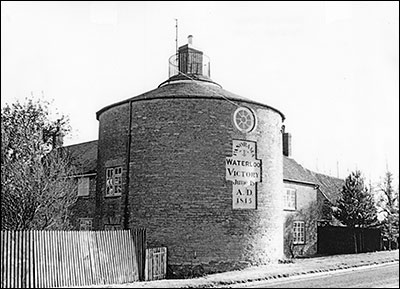|
Thos. Charles Quincey, publican, was charged by Inspector Osborn with drawing beer on Sunday morning the 16th August. Mr. Rawlins appeared for the defendant. Harry Harrod deposed that he was a policeman residing at Northampton. He went to the house of the defendant on Saturday the 15th of August. It is called the Round-house, is two miles from any village, and in the parish of Burton Lattimer. He slept in the house that night. Rose about seven on the following morning. Somewhere about eight two men came in and asked the servant girl for beer. She said she could not help them to any as she had not the key: her master was not up. Soon afterwards the landlord came down stairs, and was asked by the two men for a pint of beer, which he drew, and which was followed by another pint. Having drunk the contents on the premises they paid for it and went their way. Shortly afterwards another man came in and had a glass of ale. Then two other men came in, and after paying the landlord for two pints of beer retired from the house. Mr. Rawlins said there was no intention at wrong, and the witness was altogether mistaken respecting the men who had the beer, for they were lodgers, and had been out to gather mushrooms. He called Susannah Swann, who deposed that she lived at the Round-house, and was servant to the defendant. She remembered Sunday the 16th: came down stairs about seven, and her master and mistress about nine. Mr. Harrod slept in the house, and also a man named York, and another man whose name she did not know, but who was engaged in harvest work close by. There were no other lodgers save these two. About a past nine two men came to the door and said they were from Stanwick, and wanted a pint of beer, which she drew herself, and after they had drank it they marched off. Her master did not draw it, nor were any others served with beer. The Magistrates said there was certainly a doubt as to whether the men who had the beer were lodgers or travellers, and should give defendant the benefit of the doubt and dismiss the case, but would have him be cautious for the future.
Mr. Bold, superintendant of police, then stepped forward and said that the Round-house had for time borne a disreputable character. It frequently happened that very bad persons visited the house, which ultimately induced him to put someone in to watch the proceedings, and if this course of things was persisted in, the licence on a future occasion would most assuredly be strongly opposed. He added that the village of Gretton too still retained its notoriety for drunkenness and revelling, which often led to fighting and other baneful vices, to the great annoyance of the more sober portion of the inhabitants. The state of things he thought called forth the necessity of landlords closing their houses at a reasonable hour.
Click here to read more about this pub
|
